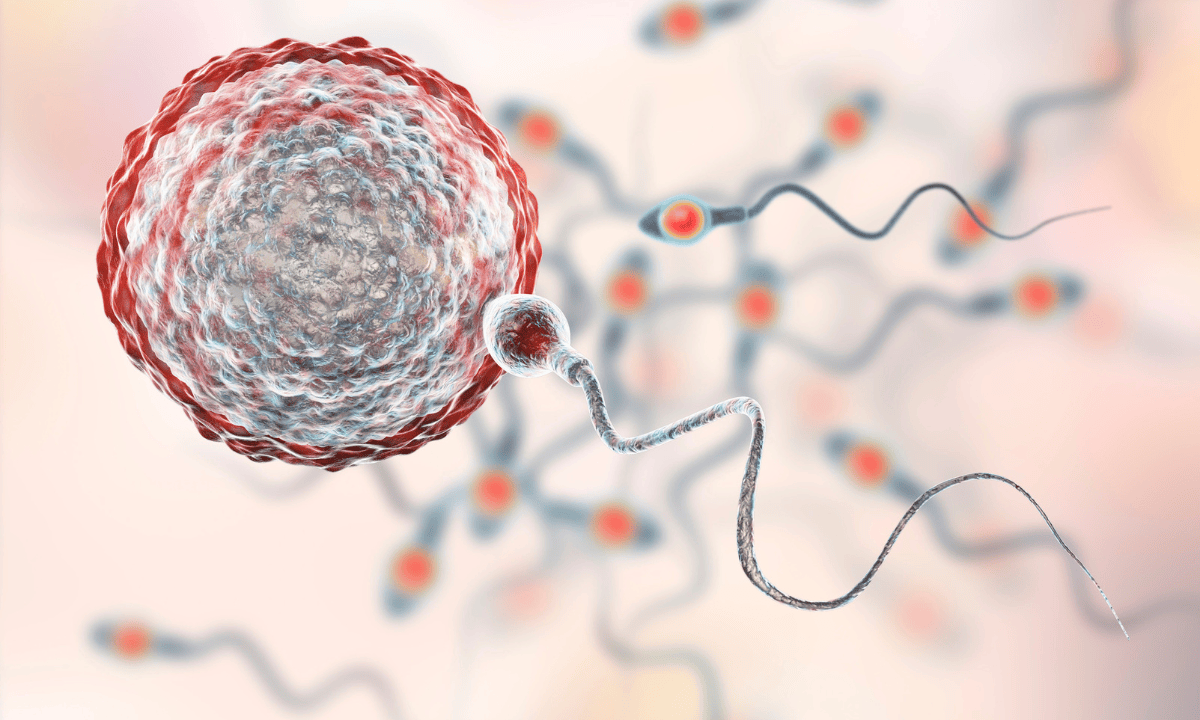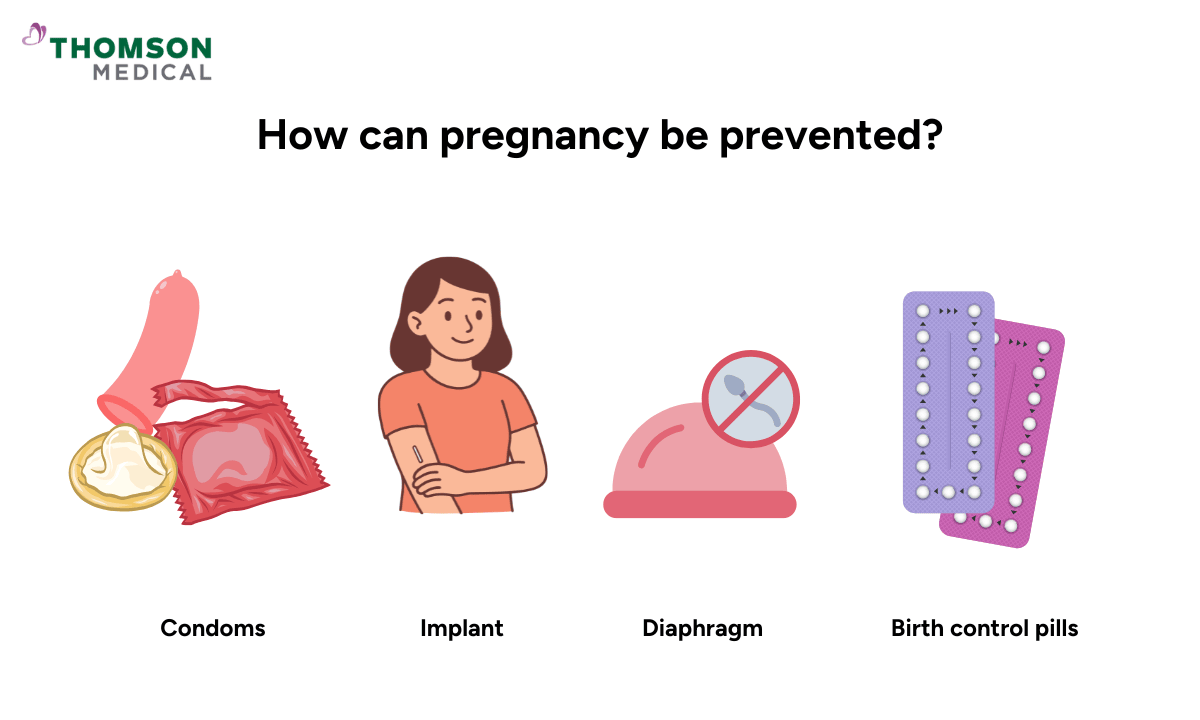You may be wondering whether pregnancy can occur without full penetration. While this isn't commonly discussed, it's a question that many couple have, especially when traditional intercourse isn't possible or comfortable. Although it's uncommon, conception can happen without penetrative sex.
Maybe you're concerned about preventing an unplanned pregnancy, or maybe you're looking for alternative ways to conceive due to medical or personal reasons. Regardless of your situation, knowing how conception works can help you make informed choices about your reproductive health.
How does conception happen?

Conception begins when your mature egg is released from your ovary during ovulation. The egg then travels into your fallopian tube (a thin tube that connects your ovary to your uterus), where it can meet sperm from an ejaculation. During sexual intercourse, millions of sperm cells enter the vagina, but only a few survive the journey to reach the fallopian tubes.
If one sperm successfully penetrates the egg, fertilisation occurs, and a zygote is formed. The zygote divides several times and becomes a blastocyst. This early-stage embryo then travels to the womb, where it implants into the uterine lining, marking the beginning of pregnancy.
Where does sperm come from during intercourse?
During sexual intercourse, sperm primarily enters the body through ejaculation. However, there’s also a small chance it can be present in pre-ejaculate fluid.
Ejaculation is the release of semen that contains millions of sperm cells. Before ejaculation, the penis may release a small amount of pre-ejaculate fluid (also called precum).
While this fluid itself isn’t made of sperm, it can sometimes contain live sperm from a previous ejaculation. This means pregnancy is possible from pre-ejaculate fluid if it reaches the vaginal area or the vaginal opening. It’s uncommon, but possible.
Can pregnancy happen without penetration?
Yes, although it’s rare,pregnancy may occur if semen or pre-ejaculate fluid comes into direct contact with your vulva or vaginal opening. For example, if ejaculation happens close to or on the vaginal area, sperm can travel into the vagina and fertilise an egg.
However, pregnancy is unlikely to happen from indirect contact, such as semen on hands, clothing, or surfaces. This is because sperm cannot survive for long outside of the body and die quickly when exposed to air.
Although only one sperm is needed to fertilise an egg, the chances of conception drop sharply without vaginal intercourse. Pregnancy is still most likely happen when sexual intercourse happens close to ovulation.
For further information on pregnancy risks from non-penetrative sexual activity, request an appointment with Thomson Medical. Our specialists can help provide personalised guidance based on your family planning needs..
How long can sperm survive inside the body?
Inside your vagina, cervix, or uterus (womb), sperm can live up to five days, especially when there's fertile cervical mucus (the slippery fluid that helps sperm swim). From there, sperm travels through your cervix, into your uterus, and up to your fallopian tube, where fertilisation takes place. Even though millions of sperm cells are released, only one sperm successfully fertilises the egg.
Since an egg can survive for about 12-24 hours after ovulation and sperm can survive inside the reproductive tract for up to five days, pregnancy can occur from sexual intercourse that takes place on the day of ovulation or within the five days before it. This fertile period is known as the fertile window.
Our specialist
Loading...
What are clinical options for pregnancy without intercourse?
If you and your partner are unable to or choose not to have sexual intercourse, or are having difficulty conceiving, there are several fertility treatment options that can help you to achieve pregnancy. These are known as assisted reproductive technologies (ART).
Intrauterine insemination (IUI):
During IUI, sperm is placed directly inside your uterus during ovulation. It's less invasive than IVF and often used for mild fertility issues.
In vitro fertilisation (IVF):
Eggs are collected from your ovaries, fertilised with sperm in a lab, and the embryos are placed back into your uterus. IVF helps when your fallopian tubes are blocked or when IUI has failed.
Intracytoplasmic sperm injection (ICSI):
A single sperm is injected directly into your egg in the lab. ICSI is used for very low sperm counts or poor sperm movement.
Frozen embryo transfer (FET):
During FET, embryos from a previous IVF or ICSI cycle are frozen and later transferred to your uterus. This offers more flexibility in timing and often higher success rates.
Your doctor can help you explore these options and determine which approach is right for you.
How can pregnancy be prevented?

If you're sexually active and not planning for pregnancy, several effective birth control options are available to help you take control of your reproductive health.
Condoms:
Available over the counter, they help prevent both pregnancy and sexually transmitted infections (STIs).
Implant:
A small rod is inserted under the skin of your arm. It releases progestin (a hormone similar to progesterone) and prevents pregnancy for up to three years.
Diaphragm:
A soft cup placed inside your vagina to cover your cervix. Some models require a prescription and fitting, though newer versions do not.
Birth control pills:
Daily tablets that contain hormones, either progestin or a mix of progestin and oestrogen. With typical use, about 6 to 12% of women become pregnant each year.
What should you do if you suspect pregnancy?
If you think you might be pregnant, watch for early symptoms such as a missed period, breast tenderness, nausea, or tiredness. Take a home pregnancy test after your missed period for the most accurate result.
If it’s positive or unclear, see your doctor for confirmation through a blood test or ultrasound. They can guide you on your next steps and provide the support you need.
If you suspect you might be pregnant, request an appointment with a Thomson Medical doctor for a reliable pregnancy test and personalised guidance on your next steps.
FAQ
Can you get pregnant from a hot tub or swimming pool?
No. Sperm cannot survive in chlorinated water or in the high temperature of a hot tub. The chemicals and heat destroy sperm almost instantly, so pregnancy cannot occur in these environments.
Can sperm go through a layer of clothes?
No. Sperm cannot pass through fabric or multiple layers of clothing. For pregnancy to happen, sperm must reach your vaginal area directly, which cannot occur through clothes.
Can you get pregnant from oral or anal sexual intercourse?
No, not directly. Oral sexual intercourse cannot cause pregnancy because swallowed semen enters the digestive tract, which is not connected to your reproductive organs. Anal sexual intercourse also cannot cause pregnancy because the anus is not part of the reproductive system. However, if ejaculate fluid accidentally reaches your vaginal opening, there is a small chance of pregnancy.
Can conception occur without sperm being released?
No. Pregnancy requires at least one live sperm. Precum on its own cannot cause pregnancy, but it may contain sperm left in the urethra from a previous ejaculation. Because of this, there is a small risk of pregnancy even if your male partner withdraws before ejaculating. The risk is lower than with full ejaculation but not zero.
Is it harmful to have intercourse without ejaculation or with withdrawal?
No. There is no evidence that avoiding or delaying ejaculation is harmful to the body. Any sperm that is not released is reabsorbed naturally. However, if someone regularly avoids ejaculation or has difficulty doing so, it may cause emotional stress or strain in the relationship. The main concern with the withdrawal method is that it is not a reliable form of contraception because precum can still contain sperm.
What are the chances of getting pregnant without unprotected sexual intercourse?
Pregnancy is possible but unlikely when semen or pre-ejaculate fluid comes into contact with your vaginal opening. The risk is extremely low or almost zero with indirect contact, such as through clothes, surfaces, or water.
Conception can also occur without intercourse through medical procedures such as intrauterine insemination (IUI), in vitro fertilisation (IVF), intracytoplasmic sperm injection (ICSI), or frozen embryo transfer (FET), all of which are medically effective ways to achieve pregnancy.
The information provided is intended for general guidance only and should not be considered medical advice. For personalised recommendations and tailored advice based on your unique situations, please consult a specialist at Thomson Medical. Request an appointment with Thomson Medical today.
Reference:
Harris, M. L., Feyissa, T. R., Bowden, N. A., Gemzell-Danielsson, K., & Loxton, D. (2022). Contraceptive use and contraceptive counselling interventions for women of reproductive age with cancer: a systematic review and meta-analysis. BMC Medicine, 20(1). https://doi.org/10.1186/s12916-022-02690-w
Killick, S. R., Leary, C., Trussell, J., & Guthrie, K. A. (2010). Sperm content of pre-ejaculatory fluid. Human Fertility, 14(1), 48–52. https://doi.org/10.3109/14647273.2010.520798
Wilcox, A. J., Weinberg, C. R., & Baird, D. D. (1995). Timing of sexual intercourse in relation to ovulation — effects on the probability of conception, survival of the pregnancy, and sex of the baby. New England Journal of Medicine, 333(23), 1517–1521. https://doi.org/10.1056/nejm199512073332301
For more information, contact us:
Thomson Specialists (Women's Health)
Thomson Women's Clinic (TWC)
- Novena:
6592 6686 (Call), 8611 8986 (WA) - Bukit Batok:
6569 0668 (Call), 8686 3525 (WA) - Choa Chu Kang:
6893 1227 (Call), 8282 1796 (WA) Jurong:
6262 8588 (Call), 6262 8588 (WA)- Katong (female doctor):
6970 2272 (Call), 8611 9020 (WA) - Punggol:
6243 6843 (Call), 8811 0328 (WA) - Sembawang: 6753 5228
- Sengkang: 6388 8125
- Serangoon (female doctor): 6382 3313
- Tampines: 6857 6266
- Tiong Bahru: 6276 1525
